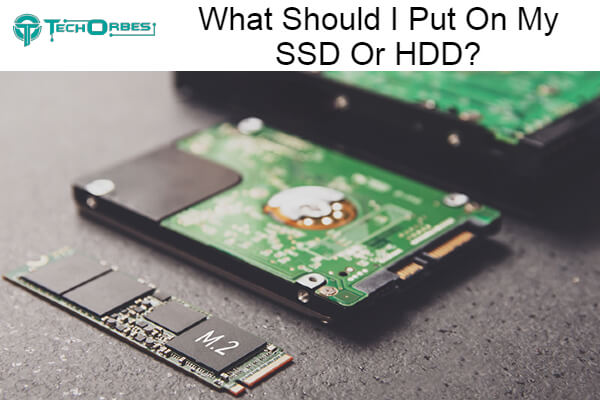What Should I Put On My SSD Or HDD?
You have a wide range of options regarding how your data is distributed when you add an SSD and an HDD to a computer setup. There are things to consider when understanding What Should I Put On My SSD Or HDD?
In general, the most practical choice is to use an SSD for your operating system and apps and HDDs for huge data storage of your stuff, such as music, photos, and videos. There are certain exclusions to this combo, though.
The combination listed above is a solid starting point and the one I most frequently use; however, I prefer some files for one drive over the other and are exceptions to this combination.
What Should I Put On My SSD Or HDD?
Your installed programs, Windows system files, and any games you’re actively playing should all be stored on your SSD. Your PC’s mechanical hard drive should house all of your huge media files, productivity files, and any other files you only sometimes access.

Why Does It Matter Where I Put My Files?
The need for various storage solutions develops as the data storage market expands. This is because not every data is used the same way and frequently needs unique specifications from the storage device to operate at its best.
There is no single solution to this problem because SSDs and HDDs each have unique advantages over the other for certain applications. Instead, we must understand their advantages and how they apply to our unique situations.
On my new laptop, I have an SSD startup drive that stores my operating system and the majority of my software, along with an HDD that holds all the project files I’m now working on. Then, I put all of my archived projects on external drives that I regularly plug in to keep them current and store all of my data in the cloud.
What Files Should I Put On SSD?
Given the advantages of SSDs’ speed, storing data that you or your computer need to access frequently on them is a good idea. This implies that installing the operating system on your SSD will provide your computer with fast access to all the programs and OS data required. As a result, the software can start up quickly and run faster.
Second, installing your software on the SSD is a good idea, especially for data-hungry applications like games or photo-editing software. This is because programs and applications must load when they are opened. Various factors can affect how quickly a program or application can load from the hard drive, which entails retrieving the required data and putting them into the RAM for use.
Storing papers, music, films, and images may not be worth the frequently constrained resources we can apply to an SSD because space on SSDs is at a premium. This is different when editing videos, audio, or graphics, because accessing those files from a temporary location can accelerate the entire process.
What Are The Benefits Of SSD Over HDD?
SSDs are far faster than HDDs. Standard SSDs can read and write data at 3 to 3.5GB/s, compared to the fastest HDDs’ 0.5GB/s. This is the first obvious distinction between the two.
The lack of moving parts in SSDs should be considered as it makes them less susceptible to mechanical wear and less likely to sustain damage from normal handling. Additionally, SSDs are available in various form factors, including M2 SSDs that use the NVMe PCIe interface for the best read/write performance and SATA SSDs that use the SATA interface.
M2 SSDs are smaller than SATA drives so that you can fit more of them inside a computer. However, this is typically limited by the motherboard’s support for PCIe connections. “Write wear,” the result of heavy operational use shortening the SSD’s lifespan, is one of the key limiting considerations for SSDs.
What Are The Benefits Of HDD Over SSD?
Since their introduction in 1956, HDDs have endured the test and remained the industry standard for data storage. The most recent HDDs are effective storage options because they are well-known and have been enhanced for decades.
Although they are less widespread among consumers (especially laptops), their demand for enterprise data storage is rising. They have a very high capacity, which is crucial considering their low cost per GB.
Although not all HDDs are created equal, the more reputable brands provide very durable HDDs that can have incredibly long lifespans, making them a practical choice for everyday information storage.
An HDD can often withstand exceptionally high volumes of reads and writes, despite the workload rates that are associated with them; these statistics are guidelines rather than constraints.
Conclusion
Let’s compare SSDs and HDDs to see What Should I Put On My SSD Or HDD? SSDs are more energy-efficient, quieter, faster, robust, and portable. HDDs are less expensive and can simplify data recovery in the event of damage.
SSDs win out over HDDs as long as the cost isn’t a deciding issue, especially since that current SSDs are nearly as reliable as HDDs. Today, HDDs are only better if you need to store a lot of data without accessing them frequently. Otherwise, an SSD offers better speed and a faster computing experience if you can afford the additional price.
Frequently Asked Questions
Do I need to store everything on my SSD?
The SSD disk will make everything speedier. So, put all the programs you wish to execute quickly on the SSD drive. Pictures don’t matter because movies and music play at bitrates that are far lower than the hard drive’s maximum speed, so there is no benefit to placing them on an SSD.
Do I want to save my files on an SSD or HDD?
Even inexpensive devices surpass conventional drives since SSDs are much faster than HDDs. Programs will load more rapidly, Windows will start up faster, and files will save more quickly. Cheaper drives often have slower write speeds, but more expensive ones have read and write speeds that are more evenly distributed.
Is an SSD more beneficial for gaming?
SSDs have an advantage over HDDs because they operate without moving parts. With an SSD inserted, games load faster and start up. SSDs improve the performance of games that stream assets from storage.
Is a 1TB hard disk preferable to a 256GB SSD?
SSD drives are around 5 times faster than HDDs despite having about 4 times the storage capacity at 1Tb (standard hard disk). An SSD disk makes a significant difference. We used to advise adding more RAM to speed up your computer, but these days an SSD disk is the best option.

Rayssa is a native American. A group of specialized individuals raised her with a passion for gaming. Here she discovered that computer games can expand your creative mind to infinite possibilities. In recent years, she has gone beyond gaming as a means of entertainment to enjoy it as a passio
